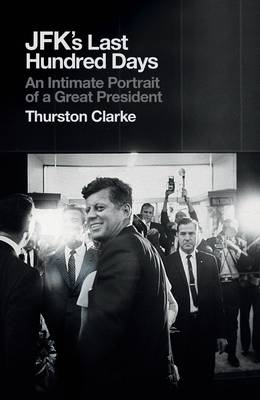Information about the book
JFK’s Last Hundred Days
Thurston Clarke
Kennedy woke to hear George Thomas knocking gently on his bedroom door. He said, “Okay,” his signal that Jackie had slept in a different room and Thomas could come in, pull the curtains, draw his bath, and drop off the morning papers.
He shaved, bathed, and put on his back brace— pulling straps, fastening buckles, and wrapping a long Ace bandage in a figure- eight pattern around the brace and his thighs that left him sitting up ramrod straight on his bed. Then he slipped on the white shirt with narrow stripes that he had ordered from Pierre Cardin in Paris after admiring it on Ambassador Alphand.
His bedroom did not face the parking lot where he would be speaking at 8:00 a. m., so he tiptoed into Jackie’s room and looked down. Several thousand people had already gathered in the half- light in raincoats and under umbrellas. “Gosh, just look at the crowds down there!” he exclaimed. “Isn’t that terrific?” When Larry O’Brien arrived to discuss how to persuade Yarborough to ride with Johnson
in today’s motorcades, he led him to the window and said, “Just look at the platform. With all those buildings around it the Secret Service couldn’t stop someone who really wanted to get you.”
He showed O’Brien the front page of the Dallas Morning News. A banner headline proclaimed “Storm of Political Controversy Swirls Around Kennedy on Visit.” A headline farther down the page said “Yarborough Snubs LBJ.” “Christ, I come all the way down here to make a few speeches— and this is what appears on the front page,” he said, adding in a harsh voice, “I don’t care if you have to throw Yarborough into the car with Lyndon. Get him in there.”
He flipped through the newspapers and found a more encouraging article in the Chicago Sun-Times. It reported, “Some Texans, in taking account of the tangled Texas political situation, have begun to think that Mrs. Jacqueline Kennedy may turn the balance and win her husband the state’s electoral votes.”
He asked Dave Powers if he had seen the crowd downstairs. “And weren’t the crowds great in San Antonio and Houston,” he added. “And you were right, they loved Jackie.”
He had been told to expect 2,500 people at the early morning rally. Twice that number cheered as he mounted the flatbed truck serving as a platform. He disliked overcoats as much as hats and shook off the Secret Service agent offering him a raincoat. He shouted, “There are no faint hearts in Fort Worth!” and the crowd roared. The rally had been scheduled early because many in the audience would be union members who had to punch time clocks. He looked down to see clerks and housewives, men in work clothes, and nurses and waitresses in uniforms— a crowd like the one in Boston that had prompted him to say, “These are my kind of people.”
He made a joke of Jackie’s absence, saying, “Mrs. Kennedy is organizing herself. It takes longer, but, of course, she looks better than we do when she does it.”
He praised the defense industries that employed many of them and promised his commitment to “a defense system second to none.” He spoke about space, another field where he would not accept second place, announcing that “next month the United States will fire the largest booster in the history of the world, putting us ahead of the Soviet Union in that area for the first time in our history.” Achievements like these, he said, depended “upon the willingness of the citizens of the United States to assume burdens of citizenship.” He concluded, “Here in this rain, in Fort Worth . . . we are going forward!”
The audiences in Billings and Salt Lake City had proved that he had anticipated their weariness with the cold war. The cheers and applause in Fort Worth confirmed that he understood that working- class Americans hungered for a noble cause. As he left for the Chamber of Commerce breakfast in the Hotel
Texas ballroom, he told Henry Brandon of the London Times, “Things are going
much better than I had expected.”

